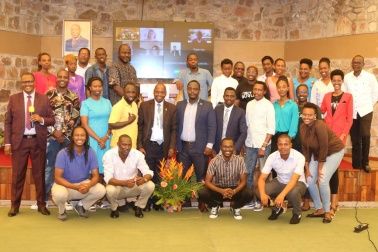Over the past two years uncertainties and disruptions created by the COVID-19 pandemic adversely affected the global tourism sector. Due to the negative impacts on the East African tourism sector, there is a need for concerted efforts among East African Community (EAC) Partner States in redesigning tourism sector strategies and policies. Therefore, in 2021, the EAC outlined measures to mitigate the negative impacts of the pandemic and to plan for the recovery of the sector with a focus on domestic and regional markets.
One of the key measures implemented since then has been building and development of capacity in the sector. Activities aligned with the EAC Tourism Recovery Strategy that highlights Human Capacity Development as a key for the recovery and thus stresses the need to train and develop the skills of various stakeholder groups in the tourism sector value chain.
In November 2021, the EAC Secretariat in partnership with East African Tourism Platform (EATP) and sponsored by Deutsche Gesellschaft für Internationale Zusammenarbeit (GIZ) on behalf of the German Federal Ministry for Economic Cooperation and Development (BMZ), launched a 16-week capacity building campaign under the “Support to East African Market-Driven and People-Centred Integration” programme (SEAMPEC). The campaign has been implemented by Tierranjani Africa, a boutique sustainable tourism consultancy firm based in Nairobi, Kenya.
The project kicked off with a pilot survey in October 2021 at the first East African Tourism Expo in Arusha, Tanzania. Due to the gained knowledge it was decided to target stakeholders in the tourism sector value chain, including MSMEs, youth, women, local communities, among others. After this, Tierranjani Africa with support from EATP conducted the training through virtual, hybrid and in-person sessions. Over 3,000 participants from all EAC Partner States attended during the course of the campaign.
“I attended the EAC-GIZ in-person capacity building session. It enabled me to grasp the real need for tour operators and other tourism stakeholders to understand both the local and regional markets and consequently develop affordable products,” stressed Audace Ndabahawe, a tour operator at Gisabo Tours in Burundi. “It has impacted our business on an ongoing basis. The training has articulated a paradigm shift and the possibility of designing attractive services and products for local and regional consumption,” he added.
Key areas of the training have been
- Understanding domestic and regional consumer behavior,
- Tour guiding,
- Sustainability approaches,
- Product development,
- Pricing strategies and mastering the art of selling,
- Digital marketing for tourism, including responsible marketing and communication for domestic and regional markets,
- Organisational development and assertive performance,
- Community based tourism.
As the curtains closed down on the 16-weeks capacity building program, the team hosted a virtual knowledge exchange platform dubbed the EAC-Africa Exchange Session on Tourism Recovery on Tuesday, 22 February 2022. The special session had a list of high profile guest speakers and over 150 attendees hailing from across Africa, all uniting with the purpose of strengthening intra-African tourism.
Giving his remarks, the chairman of the African Tourism Board, Mr Cuthbert Ncube highlighted, “The East African bloc has done so well we need this to be emulated in all the four blocs of this continent. We can all work together because Africa avails so much opportunity. […] We need decisive leadership and collaboration among all stakeholders within the tourism space. Africa, it is our time to rise. We look forward to these timely collaborations and to rebuilding the East Africa destination as one single destination.”
